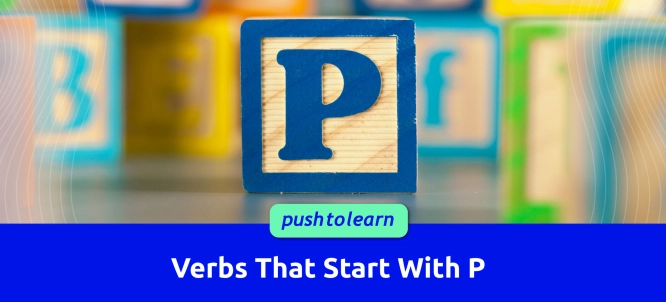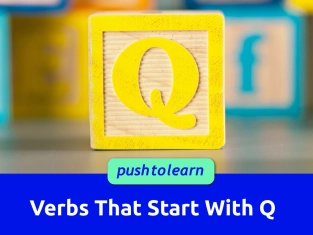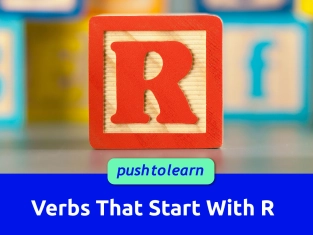by PushtoLearn
Verbs That Start With P
Table of Contents
Verbs That Start With P Exercises and Flashcards
These exercises focus on Verbs That Start With P
List of Top 50 Verbs That Start With P
|
Verb |
Definition |
Example |
|
Paint |
To cover a surface with color |
"She painted the walls blue." |
|
Participate |
To take part in something |
"He participated in the school play." |
|
Pass |
To move or hand something to someone |
"She passed the salt at the dinner table." |
|
Pause |
To stop briefly |
"He paused the video to answer the phone." |
|
Pay |
To give money for goods or services |
"She paid the bill at the restaurant." |
|
Peel |
To remove the outer layer |
"He peeled the apple before eating it." |
|
Penetrate |
To go into or through something |
"The bullet penetrated the thick wall." |
|
Perceive |
To become aware of through the senses |
"She perceived a strange noise in the dark." |
|
Perform |
To carry out a task or entertain |
"The band performed live on stage." |
|
Permit |
To allow or give permission |
"The teacher permitted the students to leave early." |
|
Persist |
To continue despite difficulties |
"He persisted in completing the project despite setbacks." |
|
Persuade |
To convince someone to do something |
"She persuaded him to join the gym." |
|
Pick |
To select or choose |
"He picked the red flower from the garden." |
|
Place |
To put something in a specific position |
"She placed the book on the shelf." |
|
Plan |
To make arrangements for something |
"They planned their vacation months in advance." |
|
Play |
To engage in an activity for fun |
"The children played in the park." |
|
Pledge |
To promise or commit |
"He pledged to donate to the charity." |
|
Plug |
To insert something into an opening |
"She plugged in her phone to charge." |
|
Point |
To direct attention by indicating |
"She pointed to the map on the wall." |
|
Pop |
To make a light, explosive sound |
"He popped the balloon with a pin." |
|
Pose |
To assume a specific position or present a question |
"The model posed for the photoshoot." |
|
Possess |
To own or have something |
"He possesses great skill in painting." |
|
Post |
To display or send something publicly |
"She posted the letter yesterday." |
|
Pour |
To cause liquid to flow |
"He poured milk into the glass." |
|
Praise |
To express admiration or approval |
"She praised her team for their hard work." |
|
Pray |
To address a deity or spirit in worship |
"They prayed for peace during the ceremony." |
|
Prefer |
To choose one thing over another |
"She prefers tea to coffee." |
|
Prepare |
To get ready for something |
"They prepared the room for the meeting." |
|
Present |
To show or offer something |
"He presented the report to the board." |
|
Preserve |
To maintain or keep in good condition |
"The organization works to preserve wildlife." |
|
Pretend |
To act as if something is true when it isn’t |
"She pretended to be asleep." |
|
Prevent |
To stop something from happening |
"The new law prevents accidents on the road." |
|
|
To produce text or images on paper |
"He printed the document for the meeting." |
|
Proceed |
To continue or go forward |
"After a short break, they proceeded with the discussion." |
|
Produce |
To create or bring into existence |
"The factory produces thousands of units daily." |
|
Prohibit |
To forbid or disallow |
"Smoking is prohibited in this area." |
|
Promise |
To assure someone that something will happen |
"She promised to call him after work." |
|
Promote |
To support or encourage |
"The campaign promotes healthy eating habits." |
|
Prompt |
To encourage someone to take action |
"Her speech prompted the audience to donate." |
|
Propose |
To suggest or put forward |
"He proposed a new idea for the project." |
|
Protect |
To keep safe from harm |
"She protects her skin by wearing sunscreen." |
|
Prove |
To demonstrate the truth or validity |
"He proved his point with evidence." |
|
Provide |
To supply or make available |
"The company provides excellent benefits to its employees." |
|
Publish |
To make something public, especially in print |
"The author published her first novel last year." |
|
Pull |
To move something toward oneself |
"He pulled the heavy door open." |
|
Punish |
To impose a penalty for wrongdoing |
"The teacher punished the student for cheating." |
|
Purchase |
To buy something |
"She purchased a new car last week." |
|
Pursue |
To follow or chase |
"He pursued his dream of becoming a musician." |
|
Push |
To move something away by exerting force |
"She pushed the box across the room." |
|
Put |
To place or set something down |
"He put his keys on the counter." |

Featured Verbs Grouped by Topics
Everyday Actions
-
Put: To place something in a particular position.
Example: "He put the groceries on the table."
Synonyms: Set, Place. -
Pick: To select or choose.
Example: "She picked a movie to watch."
Synonyms: Select, Choose. -
Pull: To draw something toward oneself.
Example: "She pulled the door open with effort."
Synonyms: Drag, Tug.
Social and Emotional Contexts
-
Praise: To express approval or admiration.
Example: "He praised the team for their excellent performance."
Synonyms: Compliment, Commend. -
Persuade: To convince someone to do something.
Example: "She persuaded him to try the new restaurant."
Synonyms: Convince, Influence. -
Pray: To address a deity or express devotion.
Example: "They prayed for good health."
Synonyms: Worship, Appeal.
Professional and Technical Contexts
-
Plan: To create a strategy or arrangement.
Example: "They planned the event carefully."
Synonyms: Arrange, Schedule. -
Promote: To support or advance a cause.
Example: "The manager promoted teamwork within the company."
Synonyms: Advocate, Endorse. -
Publish: To make information available publicly.
Example: "The magazine published an article on climate change."
Synonyms: Release, Distribute.
Everyday Use of Verbs Starting With P
-
Play
-
Example: "The children played soccer in the park."
-
Widely used for recreational and interactive activities.
-
Pay
-
Example: "She paid for the groceries with cash."
-
A basic verb for financial transactions.
-
Pray
-
Example: "They prayed for the success of their endeavors."
-
Common in spiritual or religious contexts.
Common Mistakes
-
Misusing “Pretend” as “Act”
-
Mistake: "She acted to be sick."
-
Correction: "She pretended to be sick."
-
Tip: Use "pretend" for deliberate false behavior.
-
Confusing “Permit” and “Allow”
-
Mistake: "She didn’t permit him to go out."
-
Correction: "She didn’t allow him to go out."
-
Tip: "Permit" is often more formal than "allow."
-
Overusing “Produce” for Services
-
Mistake: "The company produces excellent customer care."
-
Correction: "The company provides excellent customer care."
-
Tip: Use "produce" for goods and "provide" for services.
FAQ
What’s the difference between “Promote” and “Propose”?
"Promote" is about supporting or advancing something, while "propose" means to suggest or put forward an idea.
Can “Plan” and “Prepare” be used interchangeably?
Not always. "Plan" involves creating a strategy, while "prepare" is about getting ready for execution.
What are synonyms for “Participate”?
Engage, Join, Take part.
How is “Praise” used in professional contexts?
It’s often used to recognize achievements, e.g., "The manager praised the team for meeting the deadline."
What does “Persist” mean in challenging situations?
It refers to continuing despite difficulties, e.g., "She persisted in her efforts to finish the marathon."
Explore other Verbs:

